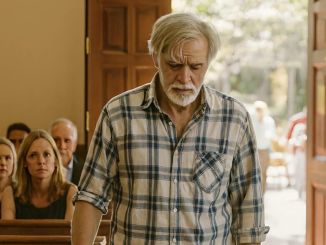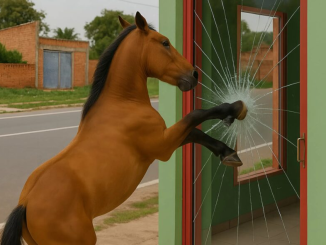
This was supposed to be our thing. Just me, our toddler, and our rescue dog, Yukon. A weekend in the woods—no WiFi, no screens, no emails pinging during bedtime stories. My wife, Alina, works full-time and needed the quiet, and I thought, perfect—I’ll take the kid and the dog, give her space, and get some quality bonding time in.
I even asked her first. She nodded, a little tired, and said, “Yeah, that might actually be nice.”
So I planned it. Packed snacks, diapers, dog food, extra batteries, everything. I took photos along the way—Yukon covered in river mud, my son holding a stick like it was a lightsaber, both of them dozing in the tent by 8 p.m. It felt like a memory in real time.
I posted one of the photos online. Nothing flashy. Just us three—sunlight filtering through gold leaves, Yukon smiling like a wolf in a dream, my son tucked on my knee. Caption said, “First annual Dad + Son + Dog weekend 🏕️”
That’s when everything blew up.
Alina saw it and called me before we’d even made it back to the car. No “how was the trip,” no “is the baby okay,” just: “What do you mean, annual?”
I told her it was just a phrase. But she was already crying. Said I’d made it look like she wasn’t part of the family. That while she was home folding laundry and meal-prepping, I was out there building traditions she wasn’t included in.
I said it wasn’t about excluding her—it was about giving her a break, doing something simple and natural with the people who needed it.
And then she said something that stopped me cold.
She said, “I don’t want breaks anymore. I want presence.”
Her words hit me like a punch to the gut. Here I’d been patting myself on the back for being such a great husband and dad, thinking I was giving her what she wanted—a moment to herself—and instead, I’d blindsided her. In trying so hard to make things easier for her, I had somehow forgotten what mattered most: us .
The drive home was quiet except for Yukon panting in the backseat and my son babbling nonsense syllables from his car seat. I replayed her voice in my head over and over again. “I don’t want breaks anymore. I want presence.” What did that even mean? Wasn’t this trip supposed to show how much I cared? How could I have messed this up so badly?
When we got home, Alina was sitting at the kitchen table, staring into an empty coffee mug. She didn’t look angry, which scared me more than if she had been yelling. She looked… sad. Defeated. Like she’d given up on explaining herself because she assumed I wouldn’t understand anyway.
“I’m sorry,” I started, but she held up a hand.
“No,” she said softly. “You’re not sorry yet. Not really. You think you are, but you still don’t see what you did wrong.”
Ouch. She wasn’t wrong, though. I sat down across from her and waited. When she finally spoke, her voice trembled.
“You know how lonely it gets here sometimes?” she asked. “How every day feels like running on a treadmill, keeping everything together while everyone else moves forward? And then you go off and have this big adventure without me, and suddenly it feels like… like maybe I’m not moving forward too.”
I opened my mouth to argue—to tell her that wasn’t true—but she cut me off.
“It’s not about the camping trip,” she clarified. “It’s about feeling left behind. Feeling like your life is happening somewhere else, and I’m just… stuck here holding everything together.”
Her honesty knocked the wind out of me. For years, I’d prided myself on being the supportive partner—the guy who cooked dinner when she worked late, who helped clean up after bath time, who always tried to lighten her load. But now I realized I’d been going through the motions, ticking boxes, without ever stopping to ask if those gestures were enough—or if they were even what she needed.
“I didn’t mean to hurt you,” I said quietly. “I thought I was helping.”
“I know,” she replied, her voice softer now. “But help doesn’t mean anything if it’s not what the other person wants.”
We talked long into the night, hashing out all the tiny grievances and misunderstandings that had built up over months—or maybe even years. By the end of it, we both felt raw but lighter, like we’d finally aired out a room that had been closed off for too long.
The next morning, I woke up early and scribbled a note:
“Dear Alina,
I’m taking you on a trip. Pack light. Be ready by noon. Love, Your (hopefully redeemed) Husband.”
When she read it, she raised an eyebrow. “Another camping trip?”
“Nope,” I grinned. “Something better.”
By noon, we were on the road with the car loaded up—not with tents and sleeping bags, but with snacks, playlists, and a map marked with random destinations. Our toddler giggled in his car seat, and Yukon sprawled across the backseat, snoring loudly. Alina glanced at me sideways as we drove.
“So where exactly are we going?” she asked.
“That’s the thing,” I said. “No idea. We’ll figure it out as we go.”
Her face lit up in a way I hadn’t seen in ages. Suddenly, it wasn’t about planning or perfection—it was about spontaneity, connection, and rediscovering each other outside the routines that had slowly pulled us apart.
We ended up at a quirky roadside diner for lunch, where the waitress gave us free pie because our son charmed her with his toothless grin. Then we stumbled upon a sunflower field stretching endlessly toward the horizon. Alina laughed until tears streamed down her face as she ran through the golden stalks, spinning in circles like a kid. Even Yukon joined in, bounding around like he’d won the lottery.
Later, we found a small lake surrounded by trees ablaze with autumn colors. While our son splashed in the shallows, Alina and I sat side by side on a blanket, watching the water ripple under the fading sunlight. Neither of us said much—we didn’t need to. The silence between us felt full for the first time in a long time.
As the weekend unfolded, I realized something profound: happiness isn’t about grand gestures or elaborate plans. It’s about showing up—for the messy, unpredictable, imperfect moments that make life beautiful. And it’s about making sure the people you love feel seen, valued, and included.
By the time we returned home, I knew one thing for certain: there would be no more “Dad only” trips. From now on, every adventure would be a family affair.
Life Lesson: Sometimes, the best way to show someone you care isn’t by giving them space—it’s by giving them your presence. True connection happens when we stop assuming we know what others need and start asking them directly. Relationships thrive not on convenience, but on effort—the kind that says, “You matter to me.”
If this story resonated with you, please share it with your friends and family. Let’s remind each other that love grows stronger when we prioritize presence over perfection. And hey, don’t forget to hit that like button—it means a lot!






Leave a Reply